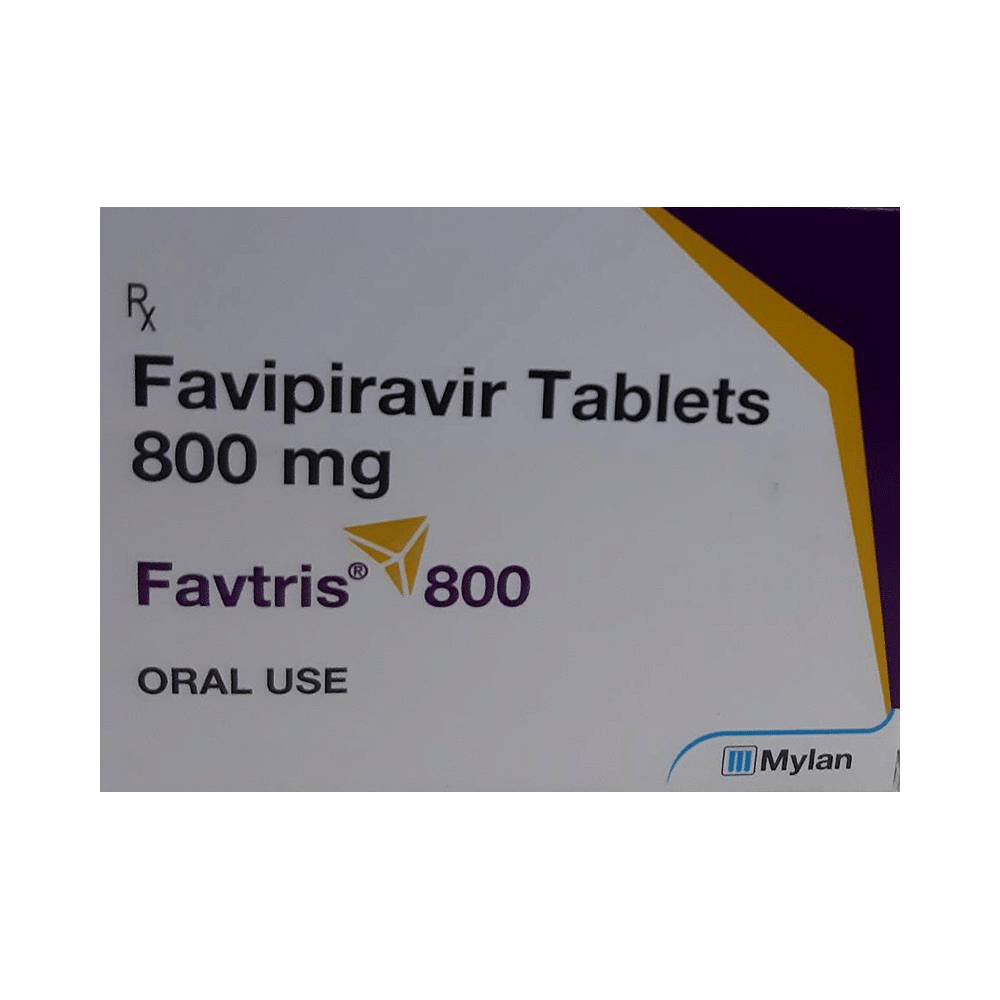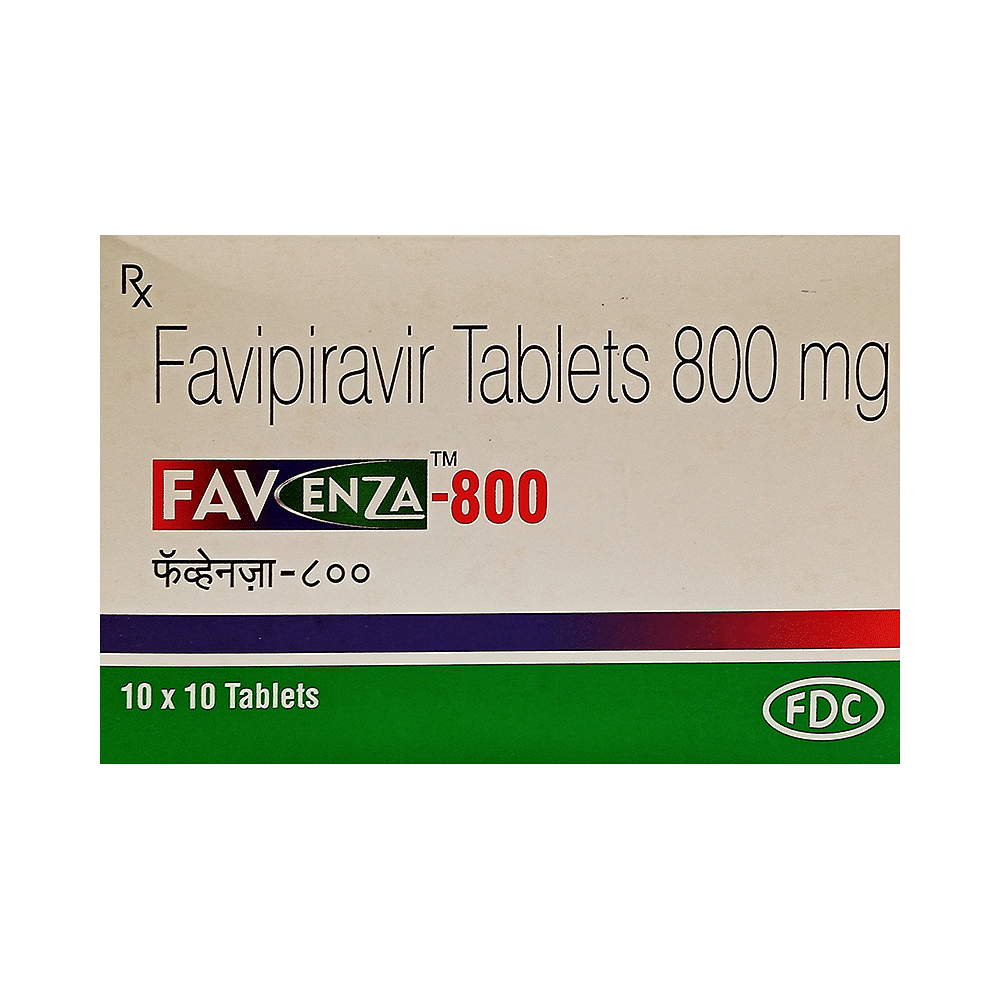
Fluguard 800mg Tablet
Manufacturer
Sun Pharmaceutical Industries Ltd
Salt Composition
Favipiravir (800mg)
Key Information
Short Description
Fluguard 800mg Tablet is an antiviral medicine used for the treatment of mild to moderate coronavirus disease (COVID-19) in adults.
Dosage Form
Tablet
Introduction
Take Fluguard 800mg Tablet only as per the dose and duration suggested by your doctor. Do not self-medicate. The most common side effects of this medicine include the increased uric acid levels in blood, diarrhea, decreased white blood cell count (neutrophils), and increased liver enzymes. If any of these side effects bother you, consult with your doctor. To make sure it is safe for you, you should let your doctor know if you have severe kidney or liver disease before taking this medicine. Fluguard 800mg Tablet is not recommended for women who are pregnant, suspected to be pregnant or breastfeeding, as it can cause harmful effects to the developing baby. Also, inform your doctor if you have a history of hypersensitivity to this drug, have abnormalities in uric acid metabolism, or have gout.
Directions for Use
Take this medicine in the dose and duration as advised by your doctor. Swallow it as a whole. Do not chew, crush or break it. Fluguard 800mg Tablet may be taken with or without food, but it is better to take it at a fixed time.
Safety Information
Side Effects
Increased uric acid levels in blood Diarrhea Decreased white blood cell count (neutrophils) Increased liver enzymes
Alcohol Warning
It is not known whether it is safe to consume alcohol with Fluguard 800mg Tablet. Please consult your doctor.
Breastfeeding Warning
Fluguard 800mg Tablet is unsafe to use during breastfeeding. Data suggests that the drug may cause toxicity to the baby.
Pregnancy Warning
Fluguard 800mg Tablet is highly unsafe to use during pregnancy. Seek your doctor's advice as studies on pregnant women and animals have shown significant harmful effects to the developing baby.
How it works
Fluguard 800mg Tablet is an antiviral medicine. It stops the SARS-CoV-2 virus from multiplying. By doing so, it decreases viral load in the body, restricts the spread of infection and helps in speeding up the recovery process.
Quick Tips
Inform your doctor if you have gout, uric acid, liver, or kidney disease. Fluguard 800mg Tablet should be administered with care to elderly patients by monitoring their general conditions. Seek immediate medical attention if you see signs of allergic reactions like red or blistering rash, difficulty swallowing or breathing, swelling of the eyelids, lips, face, throat, or tongue. It is advisable to use contraceptive methods while taking Fluguard 800mg Tablet and for 7 days after the completion of the treatment. Let your doctor know if you are pregnant or breastfeeding.
Related Medicines

Codifab 800 Tablet

Favipill 800mg Tablet

Fabikind 800mg Tablet

Favtris 800 Tablet

Favenza 800 Tablet

Torfavi 800mg Tablet

Ciplenza 800mg Tablet

Favi 19 800mg Tablet

Fabixa 800mg Tablet

Cipvir 800mg Tablet
Frequently asked questions
What is Fluguard 800mg Tablet? What is it used for?
Fluguard 800mg Tablet belongs to a class of medicines called antiviral medications. It is prescribed for managing patients with mild to moderate Covid-19 infection.
When should I start taking Fluguard 800mg Tablet?
Fluguard 800mg Tablet is best taken in individuals who have mild COVID-19 infections. It's crucial to initiate treatment early, as this will help slow down the progression of the infection and reduce symptoms such as breathing difficulty, cough, or fever. Delaying treatment may worsen existing symptoms and lead to complications like organ failure. If you test positive for COVID-19, consult your doctor immediately for proper guidance.
Who should not take Fluguard 800mg Tablet?
Fluguard 800mg Tablet should be avoided by those with known allergies to the medication or its ingredients. It's also not suitable for children and should not be given to individuals with severe kidney or liver disease. Additionally, anyone with abnormal uric acid levels or gout should inform their doctor before taking Fluguard 800mg Tablet. If you are pregnant, breastfeeding, or planning a pregnancy, consult your doctor before starting treatment.
How long and in what dose should I take Fluguard 800mg Tablet?
Fluguard 800mg Tablet dosage and duration depend on the individual's condition and guidance from their doctor. It is taken orally (by mouth) and the recommended starting dose is 1,800 mg twice a day on day one, followed by 800 mg twice daily until day fourteen. Do not self-medicate; follow your doctor’s instructions carefully for optimal treatment.
Who should avoid taking Fluguard 800mg Tablet?
Fluguard 800mg Tablet has specific restrictions based on age and health conditions. It's unsuitable for elderly individuals as their organ function may be compromised, requiring careful monitoring. Additionally, its use in children is not recommended due to potential serious side effects. If you are considering taking Fluguard 800mg Tablet and have any concerns about your health or medications, discuss them with your doctor before starting treatment.
Can I take Fluguard 800mg Tablet while pregnant or breastfeeding?
No, Fluguard 800mg Tablet is not recommended for use in pregnant women or during breastfeeding. Its potential effects on the fetus and infant are unknown. If you test positive for COVID-19 and are pregnant or breastfeeding, consult your doctor for personalized advice to ensure your safety and the well-being of your baby.
How does Fluguard 800mg Tablet work?
Fluguard 800mg Tablet inhibits the replication (process of multiplying) of the COVID-19 virus, thereby halting further spread. This reduces the amount of virus present in the body, facilitating a faster recovery process.
How should Fluguard 800mg Tablet be stored?
Fluguard 800mg Tablet must be stored at temperatures not exceeding 30 degrees Celsius. Keep it out of the reach of children.
Can I take Fluguard 800mg Tablet with other medications for diabetes and hypertension?
Fluguard 800mg Tablet is generally safe when taken in combination with prescribed diabetic or hypertensive medication, but it's crucial to inform your doctor. They will consider all factors, including any potential drug interactions, to ensure the best course of treatment.


